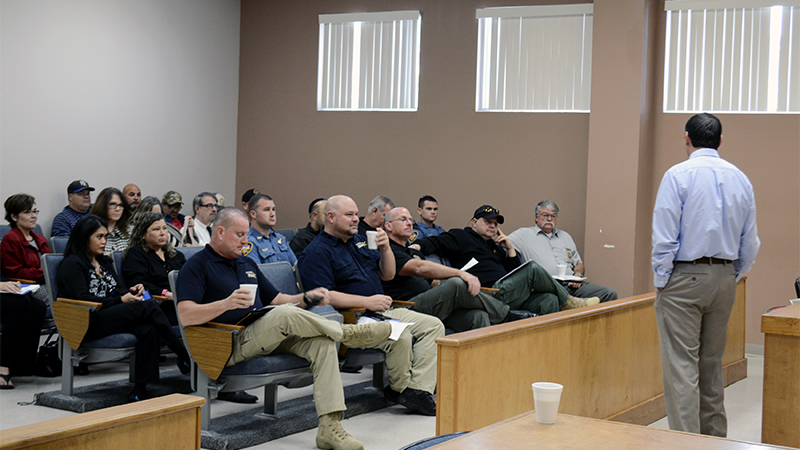Law enforcement and health workers team up to help those in need
Published 7:00 am Thursday, March 9, 2017

- In the front row, Picayune Police Chief Bryan Dawsey, Assistant Chief Jeremy Magri, Pearl River County Sheriff's Department Chief Deputy Shane Tucker and Sheriff David Allison, later joined by Poplarville Police Chief Butch Raby, hear a presentation about a new crisis intervention team that could be implemented in Pearl River County. Photo by Julia Arenstam
Pearl River County Chancery Clerk Melinda Bowman organized a meeting between local law enforcement agencies, the Mississippi Department of Mental Health and representatives of various mental health facilities.
The group gathered at the Millard courthouse on Wednesday to learn about a Crisis Intervention Team being implemented across the state through the efforts of the MDMH and various communities.
Brent Hurley, director of crisis response at MDMH, spoke to the group about how the program trains officers to determine if someone needs mental health treatment, rather than jail time.
Hurley said the program has proven to be successful in Lauderdale, Jones and Desoto counties because it is a “community collaborative.”
In 2010, the program was fully established through state law, Hurley said, providing officers with more flexibility to work with patients and bring them to treatment centers, or single points of entry, and quickly put them back on patrol.
The CIT training is a 40-hour course certified by the Mississippi Department of Public Safety and the MDMH, Hurley said. ¬
One of the most effective portions of the program is the nine hours of de-escalation training, he said.
When employed, the training leads to less officer injury and only about 10 to 12 percent of subjects being detained and transported to a mental health facility or receiving treatment from a Mobile Crisis Response Team, Hurley said.
Mobile Crisis Response Teams are already in place in Pearl River County through the MDMH, representatives from the agency said.
While some counties can have as many as 60 or 70 mental commitments per month before implementing the program, Bowman said Pearl River County can have as many as four commitments per week, but usually the number is “erratic” and hard to point down to a specific monthly average.
“The only option we’ve had, or thought we’ve had, is to charge them with something and bring them to the jail and call [the Chancery Clerk’s office],” Pearl River County Sheriff’s Department Chief Deputy Shane Tucker said.
“We may have not done the best job in the past of letting county leaders know about services we have available,” Shelly S. Foreman, executive director of the Gulf Coast Mental Health Center, said.
With resources like the mobile crisis response teams, walk-in services, and after hours phone services, there are several “layers of response available in your community,” Foreman said.
Another concern many law enforcement officials have is that oftentimes officers will speak with a subject eight or 10 times over a period of time, each time helping them get to a treatment center, but they usually end up back at home a week later with the same problems, Tucker said.
Other patients spend years in jail while waiting to get into a state facility for treatment, he said.
“Those are the folks we need to know about,” Hurley said.
The MDMH also provides mental first aid training, Hurley said, and will be offering an 8-hour course on the Gulf Coast soon.
“It’s just a taste of CIT, but just like first aid, it keeps somebody alive and safe until they can get treatment,” he said.
The group discussed forming an advisory council to organize CIT training in Pearl River County.
Hurley said depending on community efforts, establishing CIT training in Pearl River County could take anywhere from a year to three years, or longer.
Lodging and some meals are provided during the training, which takes place in Meridian about three times a year, Hurley said. Departments are also given a $400 stipend for each officer in attendance to cover salary, he said.
“If it works like you say it does, it will save us money from not having to house them in our jail,” Tucker said.





